Chinese Foreign Minister Li Zhaoxing explained at a recent meeting that the violent protests are a result of Japan’s alleged Whitewashing of its bloody 1931-1945 occupation.
According to the New York Times, the feud between the two nations has caused the lowest point in their relations in decades; disagreements over access to oil and gas reserves in the East Sea and Japan’s attempt to strengthen strategic alliances with the United States have created the clash.
China also feels that newly revised textbooks gloss over atrocities Japan committed during the World War II occupation.
Mr. Li said that “the problem now is that the Japanese government has done a series of things that have hurt the feelings of the Chinese people on the Taiwan issue, some international issues and especially the treatment of history.”
The protests throughout China grew from an online petition, a nationwide boycott movement and street demonstrations all condoned by the Chinese government. “Prime Minister Wen Jiabao said last week that China would block a Japanese bid to join the United Nations Security Council unless its neighbor apologized more sincerely and atoned for World War II-era abuses,” New York Times.
In addition to the diplomatic strain between the countries, many are worried about potential long-term economic damage.
“It is possible that Japan-China relations as a whole, including on the economic front, could decline to a serious state,” Japanese Foreign Minister Nobutaka Machimura said as he left Tokyo for Beijing on Sunday.
Within China, Japanese officials and visitors are being warned to leave the country and suspend visits. The Anti-Japanese protests are now the longest public demonstrations in China since the democracy uprising of 1989 in which was ended by bloody conflict between Chinese forces and citizens.
Troops have been deployed to China’s largest cities in an attempt to quell the uprisings but have sustained from using force in order to keep activity from turning too aggressive.
On Saturday, the authorities in Shanghai, China’s wealthiest city, allowed as many as 20,000 people to march through main arteries, tear up Japanese restaurants, smash Japanese cars and pelt the Japanese Consulate with rocks and bottles.
“On Saturday, the authorities in Shanghai, China’s wealthiest city, allowed as many as 20,000 people to march through main arteries, tear up Japanese restaurants, smashJapanese cars and pelt the Japanese Consulate with rocks and bottles.”




